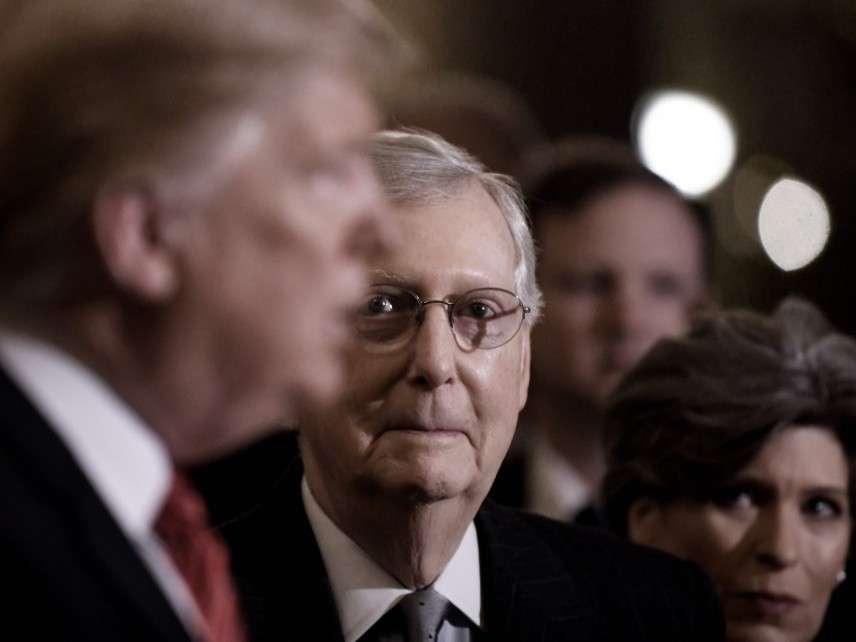Mitch McConnell is Keeping the Senate Out of the Shutdown Fight. It's a Hypocritical Abdication of Congressional Responsibility
Five years ago, McConnell declared the need to restore the Senate. Instead, he's broken it further.

In January 2014, Sen. Mitch McConnell (R–Ky.), then the GOP minority leader, gave a lengthy speech titled "Restoring the Senate."
The point of the speech was to argue for the body's relevance and importance, to make a case that the Senate was where America's toughest legislative problems could and should be worked out, through vigorous debate, seriousness of purpose, and a shared sense of serving more than a single party's short-term political priorities.
"Over the past several years, the Senate seems more like a campaign studio than a serious legislative body," McConnell said. Centralization was a big part of the problem, he argued; debate should be embraced rather than avoided. He complained that "major legislation is now routinely drafted not in committee but in the Majority Leader's conference room and then dropped on the floor with little or no opportunity for members to participate in the amendment process, virtually guaranteeing a fight." McConnell warned that brute, simple-minded partisanship would produce legislation that was both worse and less politically stable, exacerbating the volatility of both politics and policy.
Meanwhile, the Senate had become subordinate to the political priorities of the White House. That needed to change. "The Senate should be setting national priorities, not simply waiting on the White House to do it for us." The ongoing failure to buck the executive branch and minimize shallow political gamesmanship, he said, "diminishes the Senate."
Five years later, McConnell is the Senate majority leader under a GOP president, and he is running the Senate in almost exactly the manner he previously decried.
To take the most prominent recent example: One of the most notable features of the current shutdown fight is that McConnell has almost entirely absented the Senate from the negotiating process. It is a galling and hypocritical abdication of congressional responsibility. Instead of restoring the Senate, he's broken it further.
McConnell has put the responsibility to negotiate a resolution entirely on President Donald Trump and House Democrats, repeatedly saying that he will only bring a vote to the floor if Trump is guaranteed to sign it. Multiple Republican senators are reportedly concerned with Trump's demand for border barrier funding, and with the increasing likelihood that the president will circumvent Congression by declaring a national emergency, but McConnell is suborning their interests to the president's political demands.
Trump's demand for a border wall is the definition of pointless political stunt; even immigration restrictionists view the barrier as a largely symbolic goal. When talking to network news anchors earlier this week, Trump himself reportedly dismissed his trip to the border today as a pointless political stunt foisted upon him by advisers.
In the 2014 speech, McConnell cast the Senate as the platform for solving the nation's most significant disputes. "The place where it happens, the place where all the national conflicts and controversies that arise in this big, diverse, wonderful country have always been resolved, is right here in this chamber," he said. Yet McConnell now refuses to take any affirmative action to come to an agreement. He is forcing the Senate to serve as an empty pass-through for the president's partisan, political agenda. Whatever you think of the shutdown, the Senate shouldn't be sitting out the debate, taking no position and expecting everyone else to do the work.
The shutdown, of course, is not the first time McConnell has conducted Senate affairs in exactly the manner he formerly criticized. In 2017, the GOP's two biggest legislative efforts—the failed Obamacare repeal bill and the tax overhaul—were both strictly controlled by leadership, through an insular, secretive, centralized process that largely avoided the sort of extended debate that McConnell said was necessary to produce better legislation and shore up the Senate's reputation.
Indeed, under Trump, McConnell has run the Senate in almost exactly the manner he warned would corrode not only the upper chamber's stature but the entire legislative process.
Perhaps McConnell didn't really believe what he said back in 2014 and was just jockeying for power from his position in the minority. He has always been fairly comfortable with hypocrisy if it affords him a partisan advantage. But that's less of an excuse and more of a way of capturing the essential problem.
In any case, the essential dynamic that McConnell described five years ago has turned out to be basically right, at least when it comes to the spillover effects: Treating the Senate almost exclusively as essentially subservient to the executive branch, and as a platform for partisan posturing and political point scoring rather than a serious forum for legislative debate, as McConnell has, has contributed to declining trust in our governing institutions, to the poisoning of American political discourse, to the instability and fragility of public policy. He has diminished not just the Senate but American political life.


Show Comments (75)